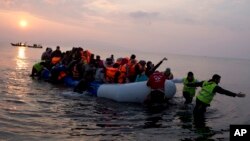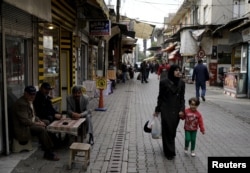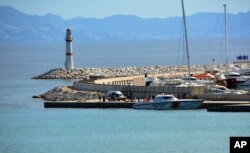War refugees from the Middle East newly arrived in Greece say Turkey's gendarmes and coast guard are becoming increasingly violent in their efforts to stop asylum-seekers from crossing the Aegean Sea - both on Turkish beaches, to disrupt the boarding of smugglers’ boats, and later when refugees are under way.
One Syrian asylum-seeker currently at the makeshift refugee camp at Idomeni on the Greek-Macedonian border told VOA that Turkish coast guards circled the small rubber boat she was in and ordered all the occupants to jump into the sea.
“They had their cameras ready and I think they wanted to film us to show how they rescue refugees,” says Ramia Sabbagh, a 19-year-old from Aleppo, who said it took 40 days for her family to organize a trip across the Aegean. In the end they were able to escape the Turkish coast guard after another refugee boat appeared, diverting attention.
Earlier this month, Britain’s BBC News broadcast a short video supplied by refugees showing Turkish coast guards hitting a boat full of migrants with sticks. The incident was in Turkish waters and the refugees on their way to the Greek island of Lesbos accused the coast guard of attacking them. Turkish authorities insist the coast guard was just trying to stop the boat without harming the occupants.
Other refugees report confrontations on beaches near the Turkish port of Izmir as they walked to prearranged meetings with smugglers.
A 27-year-old Afghan who worked as an interpreter for both U.S. and British forces in Afghanistan told VOA he and his companions made three attempts to complete the Aegean crossing before being successful on their fourth try. The previous attempts failed because they were spotted on the seafront and Turkish gendarmes intercepted them.
“They slapped us around; took our cash and cell phones,” he said. He asked for VOA not to use his name - the Taliban killed his father last year and he fears other family members could be at risk if his name is mentioned in the international media. He declined a Taliban recruitment offer, prompting his flight overseas.
There have also been accusations by Syrian refugees of having been dumped on the other side of the border back into Syria if they prove too troublesome for Turkish authorities. In December refugees said several hundred held at the Tekirdag detention center two hours from Istanbul were bused to the border and pushed back over the border into Syria. They had been among refugees who had refused to move away from the Turkey-Greece border near the town of Edirne.
Last Friday, European Union and Turkish leaders agreed to a deal whereby refugees from the Middle East as well as migrants from Africa will be returned to Turkey after landing in Greece. In return the EU will supply an additional nearly $3.4 billion in funding to help Turkey with the economic burden of the refugee crisis and will relocate to member states up to 72,000 of an estimated 2.7 million Syrian refugees currently in Turkey.
Rights groups have condemned the deal, saying it violates both EU human rights legislation and international law governing the handling of war refugees. “Turkey is not a safe country for refugees and migrants, and any return process predicated on it is being so will be flawed, illegal and immoral,” Amnesty International said in a statement on the announcement of the deal.
Any increase in violence by Turkish coast guards and gendarmes will likely encourage rights campaigners to challenge the EU-Turkey deal in the European courts, a move they have threatened.
Last month, Amnesty issued a report also accusing Turkish security forces of having shot and wounded civilians, including children, who were attempting to flee war-ravaged Syria by crossing into Turkey. The New York-based human rights organization said Turkish authorities had left thousands of civilians trapped in northern Syria after they fled their homes during a blistering Russian-backed offensive by forces loyal to President Bashar al-Assad.
“Turkey’s highly selective practice is appalling - only severely injured people are allowed entry to seek medical treatment,” said Tirana Hassan, crisis response director at Amnesty International, on the release of the report.
Turkey has long declared it has an open-door policy for Syrian refugees fleeing conflict, but the Syrian border has been shuttered to civilians for more than a year, forcing those fleeing to paying smugglers. There have been dozens of reports of Turkish border guards shooting at civilians trying to cross into Turkey.
In May 2015, VOA reported on claims by Syrian civilians that they had been shot at by Turkish guards near the town of Kilis trying to deter refugees from reaching a tunnel under the border fence.
Human Rights Watch has also accused Turkish authorities of summarily pushing back Syrians detected as they try to cross. The rights organization documented cases in a November report, saying: “Syrians described Turkish border guards intercepting them at or near the border, in some cases beating them, and pushing them and dozens of others back into Syria or detaining and then summarily expelling them along with hundreds of others.”











